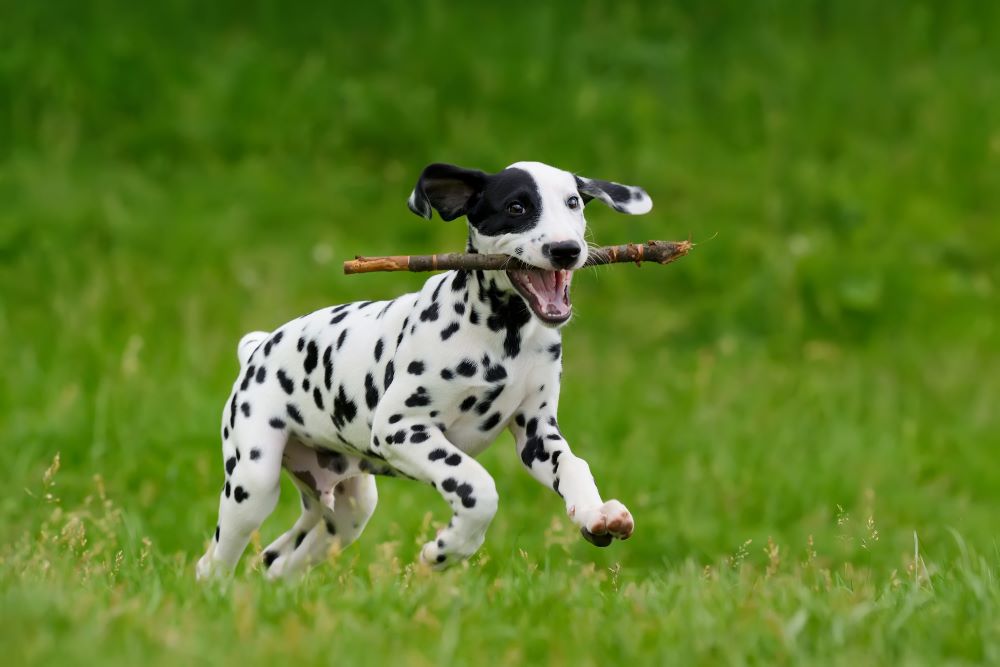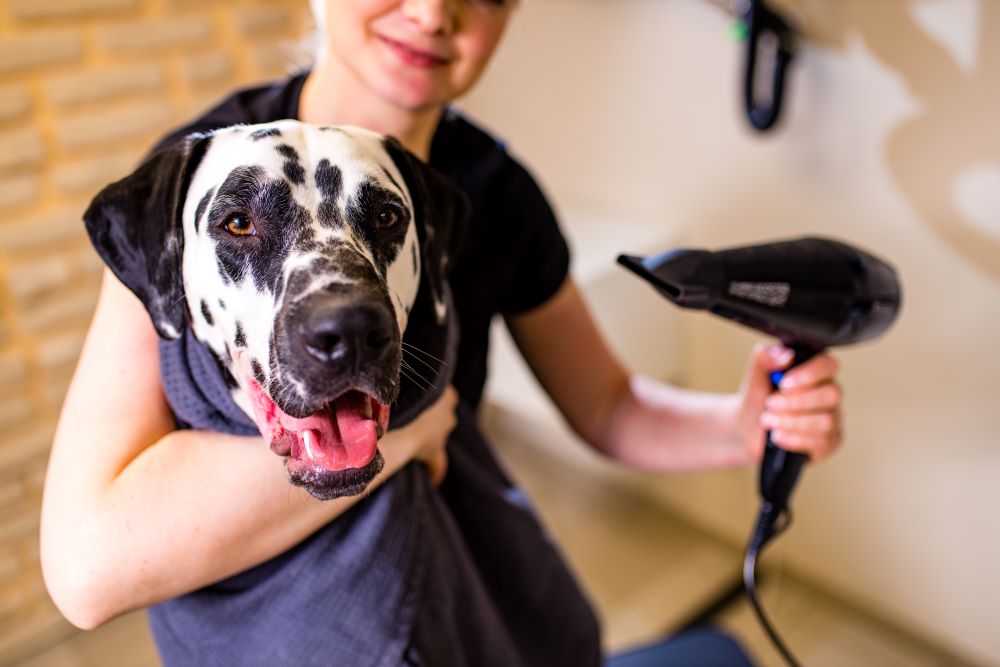Get Pet Insurance for your Cat & Dog

Zero
Documentation
Quick
Claim Process
Affordable
Premium
Terms and conditions apply*
- {{species}}
- {{indoorOutdoor}}
- {{suminsured}}
Dalmatian Dog Breed Characteristics & Information

Dalmatian dogs, with their distinct spots and playful demeanour, are often seen as iconic representations of canine charm. Their unique appearance and spirited personality make them a sought-after breed among dog enthusiasts.
In this comprehensive guide, we'll delve into the world of Dalmatian dogs, exploring their characteristics, care requirements, training needs, health concerns, and more.
What Defines Dalmatian Dogs?
Dalmatians, an ancient breed, carry an air of mystique with their striking spots. Originating from Croatia, these dogs were historically utilised as carriage dogs, guard dogs, and even circus performers.
Today, they are primarily cherished as good family pets due to their friendly demeanour and distinctive appearance. For a first-time owner, Dalmatians can be a bit challenging due to their need for consistent training and exercise.
What are the Characteristics of Dalmatian Dogs?

Dalmatians exhibit a range of characteristics that make them unique among dog breeds. Understanding these traits is crucial for anyone considering bringing a Dalmatian into their home.
- Lifespan: The average lifespan of a Dalmatian is around 10 to 13 years. Proper care, a balanced diet, and regular veterinary check-ups contribute to their longevity.
- Height: Adult Dalmatians typically stand between 56 to 61 cm tall, making them a medium-sized breed.
- Colour: Surprisingly, they're born pure white, with black or liver-coloured spots gradually appearing within weeks.
- Weight: Adult Dalmatians generally weigh between 32 to 42 kg, with males being slightly larger than females.
- Behaviour and Personality: Dalmatians are affectionate and gentle and can form strong bonds with their owners, kids, and other pets, showing love and loyalty.
- Living Conditions: They might not be the best choice for people living in apartments unless the family is dedicated to taking them for long walks or runs every day.
- Coat: Dalmatians have short, dense coats that require proper care to control shedding and maintain their appearance.
- Breed Group: Dalmatians belong to the Non-Sporting Group, a diverse category that includes breeds with varied characteristics and purposes.
- Temperament: Dalmatians are outgoing and intelligent, but may be independent and strong-willed. Early socialization is crucial for a well-balanced temperament.
- Barking: Dalmatians can be vocal dogs. Without proper training and attention, they may exhibit excessive barking behaviour.
How to Train Dalmatian Dogs?

Training plays a crucial role in caring for Dalmatians due to their intelligence and occasional stubbornness. Below are several essential training methods for Dalmatians:
- Obedience Training: Basic commands like sit, stay, and come are essential for their safety and maintaining discipline. Firm but gentle corrections are more effective than harsh discipline.
- Lure Coursing: Given their historical use as carriage dogs, Dalmatians have a natural instinct for lure coursing. This activity allows them to channel their energy positively and enjoyably.
- Agility: Engaging in agility courses provides physical exercise and stimulates their minds. Dalmatian dogs excel in agility due to their agility skills and quick reflexes.
- Tracking: Dalmatians possess a sharp sense of smell, so engaging them in tracking activities is a great method to keep their minds active. Conceal treats or toys to prompt them to use their natural instincts while searching for them.
- Off-Leash walk: Due to their energetic nature, off-leash training is essential for Dalmatians. Establishing trust and reinforcing recall commands are crucial for their safety in open spaces.
- Vocal: Training them to bark on command and to be quiet when needed can be beneficial. Rewarding calm behaviour and redirecting excessive barking helps manage their vocal tendencies.
- Potty Training: Take your Dalmatian outside regularly, especially after meals or naps, and praise them when they eliminate outdoors. Consistency, positive reinforcement, and patience are key to successful potty training.
What are the Health Problems with Dalmatian Dogs?
Although Dalmatians are typically in good health, there are particular health issues linked to this breed that owners should know about. Here are five common health problems:
- Infection: Dalmatians may be prone to various infections, including ear infections. Regular cleaning and veterinary check-ups help prevent and address these issues.
- Liver Disorder: Some Dalmatians are genetically predisposed to liver disorders. Regular veterinary examinations can help monitor their liver health.
- Deafness: Dalmatians, especially those with a predominantly white coat, may be prone to deafness. Regular hearing tests can detect issues early.
- Bladder Stones: Due to their unique urinary system, Dalmatians are prone to forming bladder stones. A carefully monitored diet can help prevent their formation.
- Atopic Dermatitis: Dalmatians may be susceptible to skin allergies. Use hypoallergenic products and monitor their skin for any signs of irritation.
How to Take Care of Dalmatian Dogs?

Dalmatians are a low-maintenance dog breed, but to keep them healthy and happy, it is essential to take care of them. Here are a few tips to keep them healthy:
- Diet and Nutrition: The best-balanced diet for a Dalmatian includes food like beef, chicken, mussels, lamb, turkey, roasted potatoes, and boiled eggs.
- Feeding: Two meals a day that include 1.5 to 2 cups of quality food are recommended for adult Dalmatians.
- Grooming: Weekly grooming is essential to control shedding and maintain the Dalmatian's distinctive coat. Weekly brushing helps remove loose hairs.
- Exercise: Dalmatians are high-energy dogs that require regular exercise. Daily walks, playtime, and interactive toys are essential to keep them physically stimulated.
- Dental Hygiene: Like many breeds, Dalmatians are prone to dental issues. Regular brushing and dental treats contribute to good oral health.
- Tick Prevention: Dalmatians, with their short coat, are susceptible to ticks. Regular inspections and the use of tick prevention measures are necessary.
- Ear Care: Due to their floppy ears, Dalmatian dogs are prone to ear infections. Regular cleaning and inspection help prevent issues and maintain ear health.
- Skin Care: Dalmatians may have sensitive skin, making it important to use mild, pet-friendly products. To keep them clean, you may give them a monthly bath.
Dalmatians are a unique and charming breed that requires attentive training and understanding of their specific needs. They should not be left by themselves for extended periods, and it's important to provide them with ample toys to ensure their contentment when alone. With the right care and love, Dalmatians can bring immense joy, laughter, and loyalty into your life for years to come.
















